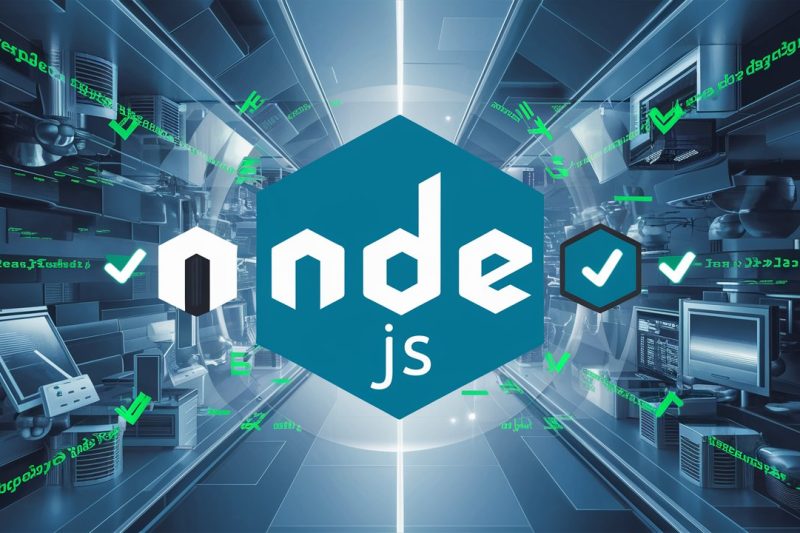NODE JS
Core Concepts of Node.js
Asynchronous and Event-Driven:
Node.js operates on a single-threaded event loop, which handles multiple concurrent operations without creating multiple threads. This non-blocking I/O model allows Node.js to manage thousands of connections simultaneously, making it highly scalable and efficient for I/O-heavy tasks.
V8 JavaScript Engine:
Node.js is built on Google’s V8 JavaScript engine, the same engine that powers Google Chrome. V8 compiles JavaScript directly to native machine code, offering high performance and fast execution times for Node.js applications.
Single Programming Language:
With Node.js, developers can use JavaScript for both client-side and server-side development. This unification simplifies the development process and allows for code sharing and reuse between the frontend and backend.
Node Package Manager (npm):
npm is the default package manager for Node.js, providing access to a vast ecosystem of open-source libraries and modules. npm makes it easy to manage project dependencies and share code with the community.

Node.js is a powerful, open-source, cross-platform runtime environment that allows developers to build server-side and networking applications using JavaScript. Introduced by Ryan Dahl in 2009, Node.js has gained immense popularity for its non-blocking, event-driven architecture, which makes it efficient and suitable for real-time applications.
Node.js Ecosystem
Express.js:
Express is a minimal and flexible Node.js web application framework that provides a robust set of features for building web and mobile applications. It simplifies the process of handling HTTP requests, middleware management, and routing.
Socket.io:
Socket.io is a library for real-time web applications. It enables real-time, bidirectional, and event-based communication between web clients and servers. This is particularly useful for applications requiring live updates, such as chat applications and online gaming.
NestJS:
NestJS is a progressive Node.js framework for building efficient, reliable, and scalable server-side applications. It leverages TypeScript and incorporates elements from object-oriented programming, functional programming, and reactive programming.
Mongoose:
Mongoose is an Object Data Modeling (ODM) library for MongoDB and Node.js. It provides a straightforward, schema-based solution to model application data, ensuring structure and validation for data consistency.
PM2:
PM2 is a production process manager for Node.js applications. It facilitates application monitoring, automatic restarts on failures, load balancing, and other performance optimizations.
Use Cases of Node.js
Real-Time Applications:
Node.js is ideal for real-time applications that require low latency and high throughput. Examples include chat applications, online gaming, collaborative tools, and live-streaming services. The event-driven nature of Node.js makes it perfect for handling numerous simultaneous connections efficiently.
API Servers:
Node.js is commonly used to build RESTful APIs and GraphQL servers. Its non-blocking I/O capabilities enable it to handle a large number of API requests with minimal overhead, making it a preferred choice for backend services.
Microservices Architecture:
Node.js fits well with microservices architecture, allowing the creation of small, independently deployable services. Its lightweight nature and ability to handle multiple concurrent operations make it suitable for building scalable and maintainable microservices.
Single Page Applications (SPAs):
Node.js is often used in conjunction with frontend frameworks like React, Angular, or Vue.js to build SPAs. It serves the backend API and provides the necessary data to render dynamic content on the client side.
IoT Applications:
Node.js is used in Internet of Things (IoT) applications due to its ability to handle numerous concurrent connections and process data streams in real-time. Its lightweight nature and efficiency make it suitable for running on devices with limited resources.
Conclusion
Node.js has transformed the way developers build server-side applications by enabling the use of JavaScript across the entire stack. Its non-blocking, event-driven architecture, coupled with the powerful V8 engine, provides exceptional performance and scalability. The extensive ecosystem, facilitated by npm, offers a wealth of tools and libraries that streamline development. Whether for real-time applications, API servers, microservices, or IoT solutions, Node.js provides a robust and efficient platform that meets the demands of modern web and networked applications.
